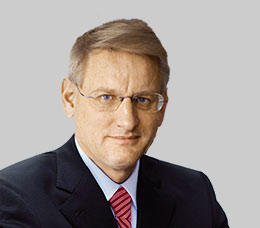
Carl Bildt
Prime Minister, Sweden 1991-1994
Foreign Minister 2006-2014
The New ‘Geopolitical’ European Commission Faces Daunting Challenges in 2020
by CARL BILDT
Published: The Washington Post, 08 January 2020
As Europe enters 2020, the new “geopolitical” European Commission has declared its intention to make the European Union a more assertive player on the global stage. While Jean-Claude Juncker’s “political” Commission was focused on domestic affairs, new Commission President Ursula von der Leyen has put geopolitical challenges front and center.
But for her approach to work, she has some important homework to address.
First on the list will be to establish a close and constructive relationship with Britain as it prepares to leave the E.U., not only formally on Jan. 31, but also in reality toward the end of the year. A bare free trade agreement for goods might be possible by the end of the year, but much more is on the agenda, and the ambition from the E.U. side should be much higher.
Here, foreign and security policies will also be important. London will probably come under heavy pressure from the Trump administration on key issues like the escalating conflict with Iran, thus breaking with E.U. partners who have sought to prevent a new war in the region. This highlights the need to set up a mechanism for close coordination on foreign and security policies between London and Brussels, while safeguarding independent decision-making on both sides. This will be tricky — but essential.
Second, she must address Balkan policy after France torpedoed previous E.U. positions by vetoing the start of accession negotiations with North Macedonia. Without a credible policy for the integration of the Balkans, the E.U. will lose the little leverage it might have in trying to move Serbia and Kosovo to a painful accommodation. A summit between all the E.U. and Balkan countries has been called for May in Zagreb, Croatia, leaving little time to sort out the present muddle.
Her third task is to translate the ambitious E.U. climate policy goals into concrete and credible steps by the member states. By the COP26 climate conference in Glasgow, Scotland, in November, there should be agreement not only on making Europe the first climate-neutral continent by 2050, but also on the more immediately demanding steps necessary to cut emissions by 55 percent within a decade.
The climate policies will have ramifications in numerous areas. Concrete steps on carbon taxes and tariffs will have large implications for a global trading system already under strain from the Trump administration’s trade war against China and undermining of the World Trade Organization. Moreover, these policies will impact relationships with major emitter countries China and India. Will they hide behind the absence of the United States, or will they go along with a more ambitious agenda set by the European Union?
If Balkan policy will be the focus during the Croatian presidency of the Council of the European Union during the first half of 2020, all signs point at China being the big issue during the German presidency that follows. A summit has been called between China and all the E.U. member states in Leipzig, Germany, in September, but it is too early to tell whether China will allow any progress on outstanding issues, including the investment agreement that has been under negotiation for years.
Russia, too, is always a source of insecurity. French President Emmanuel Macron talks about the need to open a dialogue with Moscow, but not much will come of this as long as the Kremlin isn’t ready to step back from the results of its aggression against Ukraine. As defense minister of Germany, von der Leyen deployed forces to Lithuania to help deter Russian adventurism, and she can be expected to remain firm in supporting Ukraine.
Yet it is toward the south and the southeast that there is risk of even more fires.
Whether we have passed the point of no return toward an open conflict between the United States and Iran after the targeted killing of Iranian Maj. Gen. Qasem Soleimani remains to be seen, but it’s hard to avoid the conclusion that we are on a dangerous glide path toward a wider conflict. In Iran, hard-liners were already likely to gain prominence, as President Hassan Rouhani’s policy of cooperating with the West is viewed as a failure, and now Supreme Leader Ayatollah Ali Khamenei himself is calling for revenge against the United States. The stability of Iraq could be endangered by a U.S. confrontation with Iran, and instability could easily spread, with the Islamic State and other fundamentalist groups as obvious beneficiaries.
Then there is an escalating proxy war between the United Arab Emirates, Egypt and Saudi Arabia on the one side, and Turkey and Qatar on the other, with Libya as the next flash point. The situation in the eastern Mediterranean is also heating up, with Turkey laying extensive claims for maritime rights in confrontation with Cyprus and Greece. Finally, the E.U. must contend with the increasingly difficult situation in large parts of Africa’s Sahel region.
On all of these issues — apart from trying to keep the Iran nuclear agreement afloat — the E.U. has been fairly passive in the past few years. But passivity will not do now, as things risk becoming even worse. A “geopolitical” commission must demonstrate geopolitical activity.
In spite of these major challenges, 2020 might well be just the aperitif. If President Trump is reelected in November, all bets are off as to what might follow. That means that, on top of the issues that must be tackled this year, von der Leyen must plan for the even larger challenges that might emerge thereafter.
